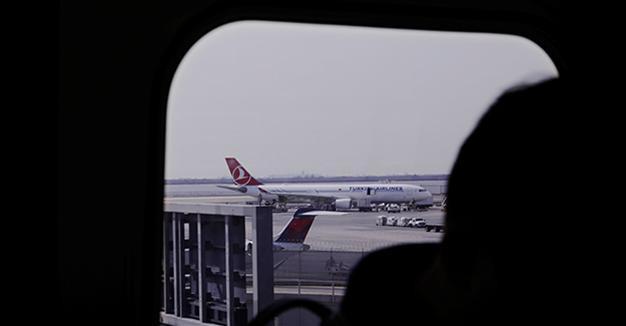Laptop ban aims to hinder business as Turkish Airlines flies high: Minister
ANKARA

REUTERS photo
New restrictions on in-cabin large electronic devices on flights from Turkey to the United States and Britain are aimed at stifling economic growth, Turkish Trade Minister Bülent Tüfenkci said March 23.
“We believe that the ban is not about security issues but commercial concerns, especially when we consider the recent development of Turkish Airlines,” he said.
“This ban is also an obstacle to the development of countries’ trade ties,” he said at an event in the eastern province of Malatya.
As such, Turkish authorities plan to take the issue to international civil aviation authorities.
The U.S. and Britain on March 21 banned large electronic devices from the passenger cabin on flights from some airports in Turkey, the Middle East and North Africa.
Extremists plan to target planes with bombs in electronic devices, the U.S. warned on March 21, adding that it was duly banning passengers from carrying them in the cabin on flights from a number of airports, including Istanbul Atatürk Airport.
Nine airlines have been given until March 25 to ban any device bigger than a cellphone or smartphone from the cabin.
The British ban only involves six countries, two of which – Lebanon and Tunisia – do not feature on the U.S. list. Kuwait, Morocco, Qatar and United Arab Emirates are on the U.S. list, but not the British one.
Turkey’s transport minister, Ahmet Arslan, said on March 23 that Ankara would take the ban to the International Civil Aviation Organization (ICAO).
“The number-one authority on the issue is the ICAO,” Arslan told reporters.
“We [Turkey] are also a council member of ICAO. We will keep fighting against it at the ICAO. If you are afraid of terror, you should be afraid no matter where it comes from and take measures accordingly,” he added, as quoted by Anadolu Agency.
ICAO, an agency of the United Nations, said on March 22 it was for each country to decide whether to take security measures.
It said in a statement it supported “global uniformity” in regulations in order to facilitate international travel.
Turkey in talks with US, UK
Turkey is in talks with the U.S. and Britain to exclude Turkish Airlines and Istanbul’s main Atatürk airport from the ban, a Turkish Foreign Ministry spokesperson said March 23.
“Instead of punishing ordinary passengers, measures targeting those who pose threats will always be more effective. Our attempts to keep Turkish Airlines and Atatürk Airport, which is one of the most secure airports in the world, out of this will continue,” Hüseyin Müftüoğlu said at a press briefing.
These initiatives are being carried out not only with U.S. but also U.K. authorities, he added.
Shares in Turkish Airlines, budget airline Pegasus and airport operator TAV fell on March 22 after the ban was announced.
In the upcoming days, the ban could deal a blow to the big, fast-growing Gulf airlines and Turkish Airlines, which depend on business-class flyers stopping over in places like Dubai or Doha or Istanbul for far-flung destinations, according to experts.
U.S. airlines do not have direct flights from the airports affected by its new restrictions.
“American airlines are going to benefit simply because airlines make their business from business travelers, so on these long flights that are in excess of eight or 12 hours, time is money – but there are definitely more pressing considerations linked to security,” said aviation analyst Kyle Bailey, president of the U.S.-based consultancy KL Bailey Associates, as quoted by AFP on March 22.
Business travelers paying top prices for flat beds and other perks may balk at stowing their laptops on long trips.
According to the Washington-based Global Business Travel Association, which was quoted by Reuters, around 49 percent of business travelers prefer to stay connected and get work done while flying. GBTA added that many companies advise staff travelling on business to keep their devices close because they may contain sensitive information.
